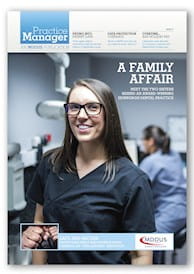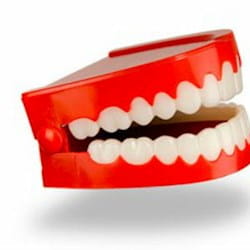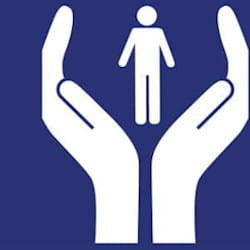MORE random items of questionable relevance from the PM team…
HELLO HUG A worrying report from the BBC suggests workplaces are seeing a rise in hugging culture. It seems the era of the polite nod or firm handshake could be coming to an end as increasing numbers of colleagues engage in physical greetings. The report cites a recent survey that found more than half of advertising and marketing executives said hugging was common, up from a third compared to a 2011 survey. Experts say the trend could be linked to more relaxed workplaces. However, there is hope for those who do not feel comfortable in the warm embrace of their workmates. Concerns over sexual harassment and a fear of accusations of inappropriate or unwanted contact could limit hug proliferation. Doctors also have an additional defence citing strict adherence to hygiene rules.
PREHISTORIC PAIN RELIEF Neanderthals with toothache may have self-medicated using plants, according to research published in the journal Nature. Remains found in El Sidrón Cave in Spain showed that one Neanderthal with a nasty abscess appears to have eaten poplar, which contains the active ingredient of aspirin. His dental plaque also had a natural form of penicillin, 40,000 years before its discovery. Alan Cooper, professor at the University of Adelaide in Australia and co-author of the study, said: “Apparently, Neanderthals possessed a good knowledge of medicinal plants and their various anti-inflammatory and pain-relieving properties ... The use of antibiotics would be very surprising, as this is more than 40,000 years before we developed penicillin.” However, he cautioned that the Neanderthal could also have eaten the plants without knowing of their medicinal qualities. The samples used range from between 42,000 to 50,000 years old, making them the oldest dental plaque to be analysed genetically. Source: CNN
LOVE IS ALL YOU NEED Which? magazine recently interviewed 15 doctors for an article entitled “10 ways to get the best from your GP”. Top of the list: “Love your receptionist”. The authors explained: “The old-fashioned view of receptionists acting as guard dogs to keep you away from your GP is outdated. Try to think of them as your ally in finding the person most skilled to help you… And don’t hate them for asking ‘is it urgent?’”.
SAVED BY A WHISKER Beards it seems were once regarded as more than just a must-have hipster accessory. An article in Smithsonian magazine reports how a similar beard trend took hold in mid-1800s England. But rather than being grown just for show, they were seen as a means of keeping men healthy. Writing in his blog, award-winning historian Alun Withey says that in the 16th and 17th centuries beards were seen as a form of bodily waste. But by 1850 attitudes changed considerably and “doctors were beginning to encourage men to wear beards as a means of warding off illness.” A thick beard, it was believed, would capture impurities in the air before they could enter the body. While it may seem far-fetched, pollution and poor air quality was a major issue in Victorian-era England and facial hair was regarded as a protective barrier. Sadly research would suggest they only serve to increase risk as facial hair is more likely to trap bacteria and food, thus increasing the chance of infection.
CAKE CAPITOL With the Great British Bake Off back on our screens – sadly sans Berry – the Oral Health Foundation has taken the opportunity to remind us that all cake is poison. Not really – but it did recently offer a reminder that a single slice of cake can exceed half our daily recommended allowance of sugar (around 30 grams). The organisation also polled thousands of Brits to discover which UK city indulged most in baked goods. Starting with the most abstemious – only 46 per cent of Aberdeen residents admitted eating a slice of cake or a biscuit daily. Compare that to the UK’s top cake-loving city, Belfast, where 83 per cent treat themselves daily. Not surprisingly that city also has some of the highest levels of tooth decay in Britain. Dr Nigel Carter, CEO of the Oral Health Foundation, commented: "We all love a sweet treat from time-to-time but having them too often can very quickly mean bad news for our health… We have to remember that every single case of tooth decay and every rotten tooth which is removed from our mouth is entirely preventable.”
LONDON WEIGHTING – FOR MILK TEETH No one is exempt from the influence of global economics – not even the tooth fairy. Research carried out by SunLife has found that in 2017 UK kids earned on average around £1.49 per tooth tucked under their pillow – which was a five per cent increase on 2016. Children in London get the most, typically receiving £1.88 on average per tooth, and those living in the South West earn the lowest amount – £1.18. But it’s not all good news: children in Northern Ireland have seen an average reduction of around 44 pence in the amount they can expect following a visit from the tooth fairy - and kids in the North East and Scotland have also seen a similar drop in the value of lost teeth. Diary’s own family tooth fairy – Peggy – was unavailable for comment.
This page was correct at the time of publication. Any guidance is intended as general guidance for members only. If you are a member and need specific advice relating to your own circumstances, please contact one of our advisers.
Read more from this issue of Practice Manager

Save this article
Save this article to a list of favourite articles which members can access in their account.
Save to library


